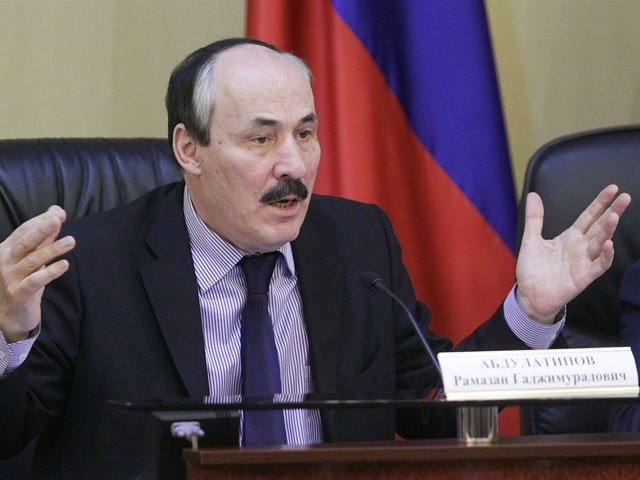
Ramazan Abdulatipov Consults Ramzan Kadyrov’s Playbook
Ramazan Abdulatipov Consults Ramzan Kadyrov’s Playbook
Nowadays, the leader of each North Caucasian republic is expected to select either the Chechen path of development or the Kabardino-Balkarian path. The Chechen path is crude, concentrating all power and resources into one person’s hands. The Kabardino-Balkarian path is about professing calmness and being in control of the situation while at the same time pursuing one’s business interests. The leader of Dagestan, Ramazan Abdulatipov, has apparently decided not to invent a new model, but instead emulate the model that Moscow successfully implemented in Chechnya. The Chechen model renders the leader of the republic completely dependent on Moscow and deprives him of the support of local clans. The positive side of this model is that it is unconditionally supported by the Kremlin.
The Chechen leadership started off by replacing the mayor of Grozny, Bislan Gantamirov (www.viperson.ru/wind.php?ID=145196), who it saw as a burden even though he was by no means as powerful as the then-mayor of Makhachkala, Said Amirov (www.vesti.ru/theme.html?tid=103534). It is clear that the acting head of Dagestan, Ramazan Abdulatipov, reached a deal with the Kremlin prior to his appointment about removing the mayor of Makhachkala, his primary adversary.
In order to fight such influential figures, the interior minister of a republic must be a reliable ally of the republican head. The current Dagestani Interior Minister Abdurashid Magomedov, an ethnic Lak, apparently suits Abdulatipov, an Avar. Ethnic Laks are forced either to ally with the Avars or with the Dargins in order to compete with the Kumyks for land and government posts. However, a substantial purge awaits the ministry, to identify and dismiss people who represent the republic’s clans (www.memo.ru/d/161075.html). If the minister does not succeed in this, he may himself be dismissed. Magomedov’s resignation was already announced once, at the start of 2013, but he managed to remain in his post (https://chernovik.net/content/lenta-novostey/naznachen-novyy-ministr-vnutrennih-del-dagestana).
Business activities in Chechnya are possible only with the explicit consent of the Chechen authorities. The problem in Dagestan was that the authorities did not control business. For example, Dagestan is the third region in Russia after Moscow and St. Petersburg in terms of commercial banks per capita (www.dagpravda.ru/?com=materials&task=view&page=material&id=6419). In Chechnya, by comparison, there are only several banks. The large number of banks in Dagestan is not an indicator of a high level of business development of the republic. Instead, every substantial businessman in Dagestan strives to have his own personal bank. So it was expected that Abdulatipov would choose to start cutting down on the number of “personal” banks of Dagestani millionaires (www.rbcdaily.ru/society/562949987236832) and Dagestani deputies in the Russian State Duma and the Federation Council (https://newsru.com/finance/19jul2013/dagdbanks.html). This process will end up in a situation in which no politician will be able to become a player on the Dagestani political scene without the approval of the “boss,” Ramazan Abdulatipov.
The acting head of Dagestan is not replicating just the Chechen approach to business. For example, after Ramzan Kadyrov criticized the Chechens who are fighting in Syria (https://kavpolit.com/kadyrov-prizval-duxovenstvo-ne-dopustit-uchastiya-chechencev-v-sirijskoj-vojne/), Abdulatipov likewise scathingly criticized the Dagestanis fighting in that Middle Eastern country. Following Kadyrov’s example, Abdulatipov also warned the press—which, in his opinion, supports the Syrian opposition (https://kavkazpress.ru/archives/19381). In particular, the head of Dagestan severely criticized the independent publication Chernovik, which in his view should be held responsible for what he sees as its illegal actions. Only a handful of publications can afford to express views that go against the official course in Dagestan. Abdulatipov sent a message that he would not tolerate media that did not support his policies. It is not surprising that journalists who investigate the business interests of members of the Dagestani government and the law enforcement agencies are so frequently murdered (www.contrasterra.ru/opinion/6768). The recent killing of the journalist with the Kavkazsky Uzel (Caucasian Knot) website, Akhmednabi Akhmednabiev, is one of such case. Akhmednabiev, an avid blogger, was known not just in Dagestan, but across the North Caucasus.
Abdulatipov stressed a hardline approach to the armed opposition, the jihadists of the North Caucasus. He admitted that some villages support the rebels. “I am addressing the jamaats that have been flirting with bandits for years, lost their sons, but still kept away from the law enforcement agencies,” he said. “In some villages they refuse to join the police and are paid for defending their own territory” (https://president.e-dag.ru/novosti/v-centre-vnimaniya/ramazan-abdulatipov-malejshee-sotrudnichestvo-s-banditami-dolzhno-karatsya-zhestochajshim-obrazom). Thus, the head of Dagestan admitted that whole villages in the mountains have alliances with the militants and do not want to swap their situation for the police’s oversight and misbehavior. Recognizing publicly the fact that there is a union between society and the jihadists, Abdulatipov hinted that he intended to put a stop to it. In order to achieve that goal, Abdulatipov will have to act ruthlessly not only toward the members of the jihadist underground, but also toward the relatives of the militants, just as in neighboring Chechnya. This will lead to increased tensions in Dagestan, since the number of people in the republic who support the jihadists is rapidly growing, unlike in Chechnya and Ingushetia.
In fact, this scenario is not a Chechen one, but a Kremlin scenario that was first applied in Chechnya, later in Ingushetia and now in Dagestan. People in the Kremlin responsible for North Caucasus policy apparently rejected taking into consideration the specific features of each republic in the region. Thus, Abdulatipov dumped the long-held concept of Dagestan being a special region unlike any other in the North Caucasus or the Russian Federation as a whole. Moscow’s new protégé in Dagestan intends to turn it into a standard Russian region, destroying the myth about its special path of development.


